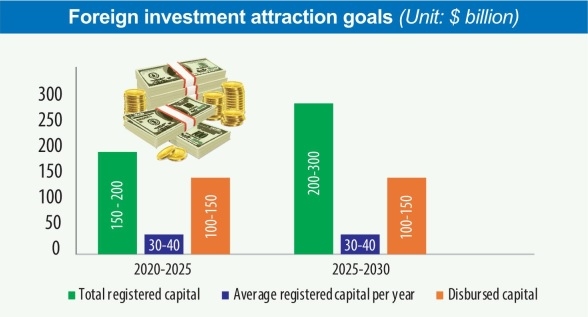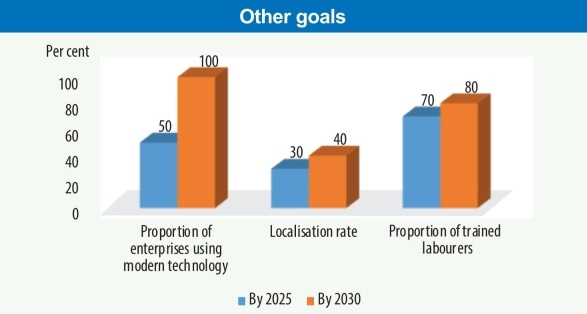New growth model for new decade
 |
| Minister of Planning and Investment Nguyen Chi Dung |
The year 2019 was full of fluctuations, including a lot of difficulties, but thanks to the efforts of the business community and the drastic directions of the Party, the government, and the prime minister, the Vietnamese economy continues achieving remarkable outcomes in various sectors.
Economic growth was maintained at over 7 per cent for the second consecutive year, ranking among the fastest-growing countries in the region and over the world. The economy is stable, inflation is controlled at a low rate, the economic structure has improved by a great deal, with positive development across economic sectors, and two-way trade turnover exceeded the $500 billion mark.
The Vietnamese business climate has also been improving significantly, which has been recognised by international investors. Vietnam ranks eighth on the US News & World Report’s list of the best countries to invest in, surpassing its Southeast Asian neighbours like Malaysia, Indonesia, and Singapore, massively boosting its 23rd position last year.
The World Economic Forum assessed that Vietnam’s competitiveness improved dramatically over all three pillars (institution, infrastructure, and human resources), ranking 67th out of 141 countries and territories, moving up 10 places from 2018, and the innovation index moved up 12 steps on the World Intellectual Property Organization’s ranking.
Among these achievements, foreign direct investment (FDI) is always a bright spot. It is the first time the disbursement of FDI reached $20.4 billion in 2019, the highest figure ever. The total registered FDI capital was more than $38 billion, the best over the last 10 years.
Specifically, the most valuable foreign-invested project last year was the capital contribution and stake purchase of Hong Kong’s BeerCo Limited, which spent $3.85 billion acquiring a stake in Vietnam Beverage Co., Ltd., a local unit of Thai Beverage Public Co., Ltd. Another Hong Kong investor Techtronic Tools Co., Ltd. poured $650 million into an research and development centre and factory in Ho Chi Minh City.
Additionally, some projects like the $420 million entertainment complex of a South Korean investor, the $410 million capital adjustment by LG Display (Haiphong), and others from Egypt’s Wanna Explore Travel, China’s ACTR, and Taiwan’s Qisda were also significant foreign-invested projects in capital value last year. These confirm Vietnam as a strategic destination for numerous multi-national corporations and indicate that the country is climbing higher up the global value chains.
These achievements were contributed by both local and foreign businesses, which will be the foundation for Vietnam’s evolution in 2020, an important year for the Vietnamese economy. 2020 is the last year of the five-year Socio-economic Development Plan (2016-2020) and prepare for the next five years, and a 10-year strategy (2021-2030).
 |
 |
FDI ATTRACTION FORECAST AT $40-60 BILLION
The geopolitical unpredictability in the region and the wider world is forecast to continue well into 2020. Economic growth, trade, and investment over the world will recover slowly. The trade tension between big economies is expected to cause several unforeseen complications. Empty room of traditional growth drivers is narrowing due to the impacts of Industry 4.0 for fast and sustainable development. Of this, Vietnam considers science, technology, and innovation as the new drivers of growth.
Against this context, in order to seize opportunities, the Ministry of Planning and Investment (MPI), after 30 years of FDI mobilisation, provided advice for the government and submitted a draft to the Politburo to issue Resolution No.50-NQ/TW on orientations to perfect institutions and policies, and improve the quality and efficiency of foreign investment co-operation activities towards 2030. This is the first-ever resolution of the Politburo specialised on FDI, set to create competitive and internationally integrated foreign investment mechanisms and policies in order to transform the growth model, restructure the economy, protect the environment, resolve social issues, and enhance productivity, quality, efficiency, and competitiveness.
Accordingly, foreign investment registration would reach about $150-200 billion ($30-40 billion per year) in the 2021-2025 period, and $200-300 billion ($40-60 billion per year) in the 2026-2030 period.
Resolution 50 confirms the significant role of foreign-invested enterprises in the economy, and they are encouraged to develop and co-operate, and compete equally with local counterparts. The state respects and protects the rights and interest of investors, ensuring harmony in interests among the state, investors, and workers.
The attraction and co-operation of foreign investment will be carried out in an “active and selective” manner, taking quality, efficiency, technology, and environmental protection as the main evaluation criteria. The strategy of foreign investment co-operation in the time to come will prioritise projects with advanced technology, new technology, high technology, clean technology, modern administration, high added value, and viral impact, connecting with global production and supply chains.
BIG PLANS FOR TIMES AHEAD
In order to realise this strategy, the government has submitted to the National Assembly for consideration and approval of the amendments to the Law on Investment, the Law on Enterprises, and the Law on Public-Private Partnership (PPP). These new laws are aimed to create a more favourable, transparent, and competitive legal framework in line with international practices in order to effectively attract high-quality foreign-invested projects, and formulating special preferential policies for strategic investment projects in service of Vietnam’s development.
In order to improve the competitiveness of the nation’s investment climate and the quality of foreign investment, Vietnam will continue to deploy the following tasks: build and perfect the legal system to ensure openness, transparency, and consistency; simplify tax procedures and customs; focus on training and improving the quality of human resources, especially skilled and professional workers, gradually reducing reliance on the advantages of cheap labour; upgrade the infrastructure system and improve connections among regions and localities; and promote supportive solutions, develop supporting industries, and gradually increase the domestic supply of materials, and develop the domestic value chain.
The MPI has also set a series of goals. Specifically, besides ameliorating the competitiveness of local businesses, Vietnam needs to ensure 50 per cent of enterprises will apply advanced technology and modern administration, and operate in a manner that is friendly to the environment. The localisation rate will increase from 20-25 per cent now to 30 per cent by 2025 and 40 per cent by 2030. To this end, the MPI provided advice for the government and submit a draft to the Politburo to promulgate Resolution No.52-NQ/TW on guidelines and policies to actively participate in the Fourth Industrial Revolution. The ministry has also provided consultancy for the prime minister to establish the National Innovation Centre in Hanoi’s Hoa Lac Hi-tech Industrial Park, and the Vietnam Innovation Network.
These will form the backbone of the legal framework to create favourable conditions for local and foreign investors to do businesses and strengthen the application of high technology in manufacturing, improve productivity and quality, as well as boost the linkages among them to promote local businesses’ participation in the global value chains. Once the main forces of the economy – both local and foreign businesses – develop and learn to connect with and support each other, the Vietnamese economy can grow faster and more sustainably.
What the stars mean:
★ Poor ★ ★ Promising ★★★ Good ★★★★ Very good ★★★★★ Exceptional
 Tag:
Tag:
Related Contents
Latest News
More News
- Kurz Vietnam expands Gia Lai factory (February 27, 2026 | 16:37)
- SK Innovation-led consortium wins $2.3 billion LNG project in Nghe An (February 25, 2026 | 07:56)
- THACO opens $70 million manufacturing complex in Danang (February 25, 2026 | 07:54)
- Phu Quoc International Airport expansion approved to meet rising demand (February 24, 2026 | 10:00)
- Bac Giang International Logistics Centre faces land clearance barrier (February 24, 2026 | 08:00)
- Bright prospects abound in European investment (February 19, 2026 | 20:27)
- Internal strengths attest to commitment to progress (February 19, 2026 | 20:13)
- Vietnam, New Zealand seek level-up in ties (February 19, 2026 | 18:06)
- Untapped potential in relations with Indonesia (February 19, 2026 | 17:56)
- German strengths match Vietnamese aspirations (February 19, 2026 | 17:40)



















 Mobile Version
Mobile Version